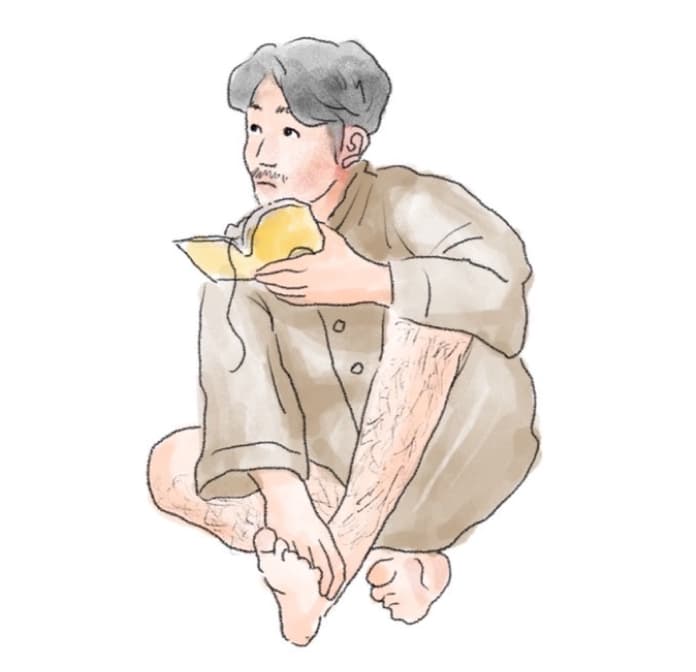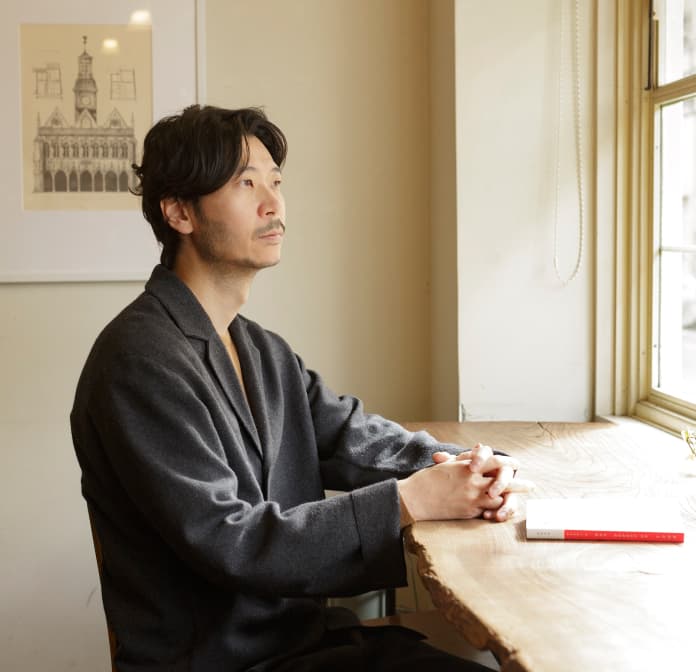Yuto stared up at the ceiling, but the wood grain looked like clumps of worms, about to squirm around; he squeezed his eyes tight shut. Lying in his futon, he couldn’t get to sleep—by his side, his gran was reading him folktales.
“…Soon afterwards, the family of that house and their servants, who numbered more than twenty all told, were poisoned by toadstools. They all perished in a single day, save a seven-year-old girl, who grew old without producing an heir, and in time fell ill and died.”
“Nooo!” Yuto frantically burrowed under the covers of his gran’s futon. After the zashiki-warashi spirits moved out of a house, the people who lived there were doomed to horrible fates—Yuto was very young, and he felt how unfair and terrifying it was.
Gran did her best to comfort him. “There, there, I didn’t mean to scare you. But you know, zashiki-warashi aren’t malevolent beings.”
She patted his head as he snuggled up to her, but the idea that zashiki-warashi left and took away people’s happiness lodged in his mind; he sobbed bitterly and eventually cried himself to sleep.
*
“What—propose?” Yuto choked out. His low-alcohol cocktail had gone down the wrong way.
His friend Keita had pressured him into coming along to check this place out, to see whether Keita should bring his girlfriend here, as she had wanted to go to a late-night cafe. And then Keita had casually dropped that into the conversation like an afterthought.
“She’ll like it here—it’s got a great vibe,” he went on, over Yuto’s sputters.
Yuto coughed and cleared his throat. “Nice of you to be so thoughtful.”
“Where do you take your girlfriend on dates?”
Uhhh—Yuto swirled the drink around in his glass. “I dunno. It’s so hot in the summer, so cold in the winter, I don’t feel like going out much, I guess...”
Keita looked at him for a long moment, his eyes serious, and then grunted as if to fill in the awkward pause. “Hasn’t she said she’d like to get married soon?”
“Uh-uh. I mean, she hasn’t brought it up.”
“What about you, Yuto?”
“Ummm. I ... dunno.”
You dunno, Keita echoed, looking briefly appalled. “So you’re more focused on your career at this stage?”
“Uh-uh. I don’t care about getting promoted or anything like that.”
“Well, that’s one approach.”
“Mmhm.”
Keita glanced away and tapped his phone. “Anyway, this is the engagement ring I’m looking at.”
Yuto peered at the phone that Keita angled toward him. On the screen, an intimidating diamond sparkled in a pink gold setting. “Wow.”
“I know, right?” Keita swiped through a few more pictures, beaming.
Other than “wow”, Yuto had no idea what to say. Keita was focused on his phone, looking at the gleaming ring. Yuto had to stop himself before he admitted out loud: you seem really happy.
Yuto got back to his studio apartment and gargled as usual, but the sweetness of the cocktail lingered in his mouth. He should’ve had the parfait instead; that was the late-night special.
He took a quick shower and sprawled out on the bed. When he looked at his phone, there were several missed calls from his mum. What a pain, he thought, but he called her back.
Her voice came booming down the line almost immediately, shouting “You hardly ever return my calls!”
“What?” Yuto turned the volume down.
“Don’t you ‘what’ me! So yesterday I went to your gran’s, okay? She wants to see you.”
“Um, okay.”
“She asked me how’s Yuto, is he alright living all alone, what’s he been up to? But I couldn’t answer any of that because you never tell me anything!”
“Ah…”
“Don’t you ‘ah’ me. Look, you said you were going to take the week after next off, right? I told Gran you’d go see her then.”
“Huh? No, I might have mentioned it, but you can’t just go and make plans for me like that...”
“You’re the one who hasn’t been to see her in such a long time; honestly, if I didn’t do something you wouldn’t organise it yourself, now would you? You’ve always been so...”
“Okay, fine, I’ll go. Bye.” He hung up before she could get started on his other personal failings.
He hadn’t been to visit his gran since junior high. It wasn’t that he didn’t get on with her. When he was at school, every time he got the traditional New Year’s gift of money from her via his mum, he’d call and thank her, and once he was out in the real world, they exchanged New Year’s greetings cards. He had sent a gift last year to congratulate her on marking her 80th year, the traditional milestone of Sanju. But he didn’t like how gossip had a way of spreading in the countryside, or how his relatives got on his case. The different feel of the house she lived in, which was old-fashioned compared to his parents’ place in Tokyo, might have put him off too. The year the great earthquake struck, he had genuinely wanted to go with his mum to check on how Gran was coping in the aftermath. However, as the TV bombarded him with horrific footage of the disaster, he couldn’t bring himself to go. Whenever he imagined his gran’s misery or his mum’s exhaustion, the dread would crush him all over again, and he couldn’t shake the urge to stay in Tokyo and try to blank it all out. By the time normal service was restored and he could call his gran, she told him it would be too difficult for him to visit just then, and to his shame, he accepted her words at face value.
Yuto turned back to his phone and tapped out a quick message to let Hiroka know he was headed for Iwate.
It’s a long way away, so I thought I should probably let you know
Her response pinged back quickly:
You should always let me know, not just probably!
It’s only one night at my gran’s
Can I come with?
He hammered out a reply, not giving it much thought:
Whatever
What do you mean, whatever?
Don’t mind either way
So it’s all the same to you? You didn’t think to invite me?
Yuto pushed down the urge to argue back and ask what her problem was, and he sent a few more messages to placate her, saying things like: we wouldn’t be staying at a ryokan, so it wouldn’t be much of a holiday; it’s way out in the countryside, but if you don’t mind that; maybe we should plan some kind of trip for a later date, etc, but she didn’t reply again.
Alone, Yuto boarded the Tohoku Shinkansen.
Iwate’s closer than I thought, he realised, and immediately regretted not taking the night bus instead, which would’ve been much cheaper than the bullet train, since he was travelling solo.
On an afternoon long after the summer holidays, he had expected the train to be deserted, but it was full of all kinds of people: business travellers, groups of middle-aged women, and families with children. He didn’t need to commute to rural areas for his job, and he couldn’t imagine himself as a father. In a few decades time, when he reached his mum’s age, he couldn’t picture himself enjoying a trip with a group of friends, either.
He killed time by playing with his phone and staring out the window, and then changed from the bullet train to a local train, getting off at the station closest to his gran’s house.
As he left the station, he was greeted by three kappa statues. Perched on boulders in a pond edged with stones, the reddish-brown water sprites seemed to be in the middle of a chat. They had the air of salarymen hitting the pub after work. All three were as long-limbed and spindly as a certain comedian who was constantly on TV.
“Yutooo!”
Yuto looked around and saw a woman in her forties running toward him. Behind her, a tiny pink-beige microcar was parked. She must be Ms Sasaki, his gran’s neighbour. His mum had told him about her: apparently she had moved here from Tokyo a few years back, and his gran was very close to her; she sometimes helped out with the farm work, or lent out her cute car when his gran had errands to run.
He said hi, and she encouraged him to climb into the back seat. The way she spoke reminded him of the kindly manager who had shown him the ropes when he was new to the workplace. She told him that Gran had been in good spirits every day lately and laughing at all her anecdotes. He was reassured to hear that his gran was happy.
Driving along the road, jolting and bumping at times, they passed a few large, relatively new houses among the fields of vegetables.
A few minutes later, they arrived at his gran’s house, an ancient wooden hiraya; coming back there after such a long time, Yuto was struck by the lonely, isolated nature of the wide acreage. It gave him a twinge of anxiety to think of his gran out there, working in the fields all alone.
He thanked Sasaki, who had to be off on her next errand, got out of the car and set foot on the weed-dotted ground. He looked up at the roof of the house, which had been repaired in one section with deep red tiles; the outside of the wooden house had deepened to a much darker brown than he remembered.
He rattled open the sliding door to reveal the concrete doma space, and the earthy-musty petrichor of a massive tree after rain flooded his nostrils.
“Oh!” his gran exclaimed, in a tone of surprised joy. “I’m so glad you came,” she said over and over, gently patting him on the arms and back in welcome. “You’ve really grown. It must be hard, all alone in Tokyo.” She took his hand and led him inside.
When he went to wash his hands at the basin, he used the tap with the little red circle on it, but the water didn’t warm up, so he had to rinse the soap off with cold water.
Glancing through the bathroom’s half-open door, he noticed the yellowing white showerhead which lacked a water pressure control, and the motley blue, white and black tiles that covered the floor. A faint smell of two-in-one shampoo floated out, a brand that hadn’t changed in decades.
He took a seat in the living room and reached out for a fun-size bag of sweet treats from the tray on the table. Next to the tray stood a vase of flowers as big as his palm, along with the same Nambu ironware teapot she had always used. It was exactly the same scene he remembered from childhood.
“You finally get a holiday, and your mum tells you to come all the way out here? Sorry about that, I know you have a lot on.” His gran settled her comfortably rounded hips into a chair.
“Oh, yeah, I’ve been quite busy...” Yuto swallowed. “Sorry it’s been a while. I’m happy to see you’re so well.”
“I’m wonderfully well. Now, I should get dinner started—you must be hungry?” And, without demanding why he had failed to visit her for so long, as he had feared, she calmly got up and headed for the kitchen.
“I came here to see you, that’s all—you don’t need to bother too much about dinner.”
“Don’t give me that. You’ve come all this way, so I want you to eat up, and please don’t hold back.” She deliberately wrapped her half apron around her waist.
The kitchen floor, with its faint pattern of little cream flowers, took him back to his childhood. It had felt a little sticky to walk on in bare feet, he recalled. The old-fashioned gas stove, a bottle of soy sauce left out, three calendars hanging on the wall, the dish cupboard with the frosted glass doors, and the stacks of aluminium pots ... time seemed to have stopped here since his last visit back when he was in junior high.
Left at a loose end, Yuto watched his gran as she busied herself in the kitchen.
“It’s hard to cook with you watching me like that,” she said, but she looked gleeful.
Yuto felt he should offer to help, but there didn’t seem to be anything he could do, so he continued to look on. The leeks he glimpsed over his gran’s shoulder were longer than the ones to be found in Tokyo, and the shiitake mushrooms looked luscious.
The chopped vegetables tumbled into the pot on the stove with splashing thuds.
“Hellooo!” a familiar voice called out from the front door. Gran must have invited Sasaki over for dinner.
“This is my contribution.” Sasaki proffered a plate wrapped in clingfilm.
Gran’s face lit up. “Oh, tofu dengaku, how lovely.”
“Yuto, you might not have had this before,” Sasaki said.
“I’m excited to try it,” he said politely. The long pieces of tofu were nicely browned, with a miso glaze.
“The traditional way is to skewer them and grill them on the hearth, but they can also be fried in a pan,” Sasaki explained.
“Oh, that’s great.”
When Sasaki took off the clingfilm, a delicious aroma of garlic wafted out. She deftly set the plate in the middle of the living room table and bustled back to bring his gran’s dishes in from the kitchen. “Ooh, hittsumi soup!”
That must be the soup Gran was preparing earlier, Yuto thought, as he sat there awkwardly waiting for the food to be set out. He seemed to have missed the window to offer to help; when he turned toward his gran, she beamed at him and asked if he would like some mugicha, as she got the cups out.
The table was laden with the hittsumi soup, white rice, tofu dengaku, greens with a walnut dressing, and sakana no nitsuke, a fish dish simmered in flavourful sauce. In sync with Sasaki and his gran, Yuto put his palms together and said, “Itadakimasu.”
The hittsumi soup had a smooth, mellow dashi flavour that slipped down his throat easily, and he felt it gently warming his insides. He asked his gran what the mochi-like things in the soup were, holding one between his chopsticks. She explained that it was a hittsumi dumpling, made by kneading soft wheat flour, salt, and hot water into a dough; the dough was torn into small pieces by hand and simmered in the broth to soak up the flavour.
He took a bite of Sasaki’s tofu dengaku—as he expected, it had the punchy garlic tang he loved. The sakana no nitsuke, which his gran said was left over from yesterday, was so delicious that he couldn’t stop eating more and more of it, and he shovelled down the rice.
“Your gran taught me that walnuts go so well in a dressing,” Sasaki began, with an easy smile. “Sorry for gate-crashing your family reunion, but we have so much fun together, I’m constantly popping over.”
People seemed to naturally flock to his gran; locals were always coming round to share food or dropping by for a chat and to check on her, one way or another.
“Yuto, it might be hard for you to see it objectively,” Sasaki led in, “but while your gran’s house is old, it’s so beautiful, don’t you think? The garden produces a lot of vegetables, let’s go see it later; we pulled turnips that were a really unusual colour,” she rattled on. Every time Yuto responded, with a “mmhm” or an “uh-huh”, Gran smiled at him.
“Garden”—the word summoned up a vivid memory of the girl he used to play with.
*





